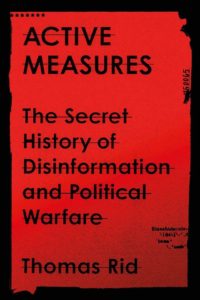The bad news about disinformation? Research has shown it spreads faster than truth. Conspiracies fueled by misinformation can have potent, lasting impacts on individuals’ trust in science, and beliefs rooted in misinformation are often felt strongly. This can mean that simply debunking the claim with facts can actually lead to further validation of the belief, writes Genna Reed, lead analyst at the Union of Concerned Scientists. The good news? –
Research has shown that, similarly to how vaccines work, inoculating people against disinformation by warning them of the tactics and providing alternative, accurate information can work to reduce the likelihood of disinformation taking hold. The first line of defense against disinformation about COVID-19 is recognizing it. Next, you can help stop its spread by sharing information from reliable sources, like public health experts, and trying out ‘prebunking’ of disinformation in your networks.
 One of the conclusions of Thomas Rid’s Active Measures is particularly striking, notes Rick Ledgett, former Deputy Director of the National Security Agency. He basically says that because active measures are designed to interfere with a society’s ability to resolve internal conflicts, and that the evaluation of the effectiveness of active measures is a political judgment call, then a judgment that a disinformation campaign was successful makes it successful, he writes for The Cipher Brief:
One of the conclusions of Thomas Rid’s Active Measures is particularly striking, notes Rick Ledgett, former Deputy Director of the National Security Agency. He basically says that because active measures are designed to interfere with a society’s ability to resolve internal conflicts, and that the evaluation of the effectiveness of active measures is a political judgment call, then a judgment that a disinformation campaign was successful makes it successful, he writes for The Cipher Brief:
I agree with this at the macro level, but at the individual level I think, even absent a national judgment, the successive impact of elements of disinformation can succeed at undermining faith in societal and governmental institutions, in effect hollowing out citizens’ beliefs in the foundations of democracy. A quote early in the book, from the Stasi’s disinformation chief, is telling. “For the man on the street it is getting harder to assess and to judge the written word. He is ever more helpless in the face of the monsters that are opinion factories. This is where we come in as an intelligence agency.”
 Private-sector platforms should acknowledge and embrace their own free expression right to combat political disinformation and to protect democracy, argues Eileen Donahoe (left), executive director of the Global Digital Policy Incubator at Stanford University, Cyber Policy Center, and a National Endowment for Democracy (NED) board member.
Private-sector platforms should acknowledge and embrace their own free expression right to combat political disinformation and to protect democracy, argues Eileen Donahoe (left), executive director of the Global Digital Policy Incubator at Stanford University, Cyber Policy Center, and a National Endowment for Democracy (NED) board member.







